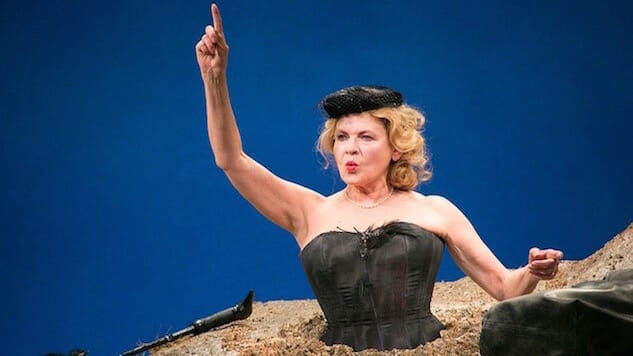Dianne Wiest Takes on Beckett in Happy Days
Gerry Goodstein
In the 1980s, Dianne Wiest emerged as a movie star, with memorable turns in Footloose, Bright Lights, Big City, Parenthood and Edward Scissorhands plus five Woody Allen movies—she earned three Oscar nominations and took home statuettes for Hannah and Her Sisters and Bullets Over Broadway. As movie roles became more scarce—and Wiest, who is now 69, has been outspoken about how Hollywood casts aside women of a certain age—she turned to TV, nabbing four Emmy nominations and two trophies between 1997 and 2009, and getting a regular series from CBS, Life in Pieces.
But that’s the celebrity take on Wiest’s career. And it kind of misses the point: she is a theatre actress through and through. She left the University of Maryland to join a touring Shakespearean troupe, made her Broadway debut in 1971 at age 23 and then spent four years at the Arena Stage in Washington in such iconic roles as Emily in Our Town, Honey in Who’s Afraid of and Virginia Woolf?, before returning to New York. She won an Obie and soon was on Broadway in major productions like Othello, playing Desdemona opposite James Earl Jones and Christopher Plummer, and the comedy Beyond Therapy.
Wiest’s theater career has continued to flourish in the last decade on Broadway (All My Sons) and off (Chekhov’s The Seagull and The Cherry Orchard). “If someone told me I couldn’t do a play again I’d feel like I was in forced retirement,” Wiest says. “It’s not that film isn’t rewarding, but film is like putting beads on a string, little tiny beads of only sixty or ninety seconds but in theater you get this whole huge necklace all at once. And there are more rewarding roles for women in theater.
In 2016 at Yale Repertory Theatre, Wiest took on the the epic role of Winnie in Samuel Beckett’s Happy Days, in which she must remain cheery throughout a first act in which she’s immobilized in a mound from the waist down and in a second act in which the mound is up to her neck—and except for a few words spoken by her husband, every line is hers. The play was a success and now Wiest is tackling it again, in Brooklyn at Theater for a New Audience Polonsky Shakespeare Center.
Paste: You’ve said that you first wanted to do this show back in the 1980s. What is it about Happy Days that drew you in?
Wiest: It was and still remains most impossible mountain to climb for women. It’s like Hamlet for women. You are so restricted but within the boundaries of what Beckett has written he provides you with incredible freedom.
I was gonna die with some big gap in myself if I had failed to do Happy Days. If I had my wits about me I would have done it twenty years ago.
Paste: What kept you from doing it back then?
Wiest: Terror. In a word, terror.
Paste: Why?
Wiest: I couldn’t figure out how to memorize it. Do you memorize the words and then go back and figure out where you put the toothbrush down and where you take the cap off and put the glasses on? Do you memorize the physicality of it and will that help you memorize the words? Do you memorize both at once? I didn’t know.
Two years ago, a year before I did it at Yale. I memorized both at once—as best as you are able without props, sitting at your kitchen table. If you didn’t bother with the physical actions you couldn’t do the words.
Paste: Did you feel more pressure when you moved from your kitchen table into the mound?
Wiest: My first time in the mound was my first feeling that this was possible, that I might be able to do this. Sitting at the kitchen it just felt humiliating and embarrassing.
Paste: What is it like being in the mound at first?
Wiest: James Bundy, the director, told me early on I was overcoming the obstacle of the mound—I would swivel in it and take all this freedom. Then when they close you in at the front and the back you really cannot move. That’s an incredible thing. You are trying to reach my husband, Willie, trying to reach anything and you can’t. And you ache, your neck hurts but still you have to reach.
-

- Curated Home Page Articles By Test Admin October 21, 2025 | 3:10pm
-

- Curated Home Page Articles By Test Admin October 21, 2025 | 2:57pm
- Urls By Test Admin October 21, 2025 | 2:57pm
- Curated Home Page Articles By Test Admin October 21, 2025 | 2:55pm
-

-

-

-

-

-

-

-

-

-

-

-

-

-

-

-

-

-

-

-

-

-

-

-

-

-

-

-

-

-

-

-

-

-




































